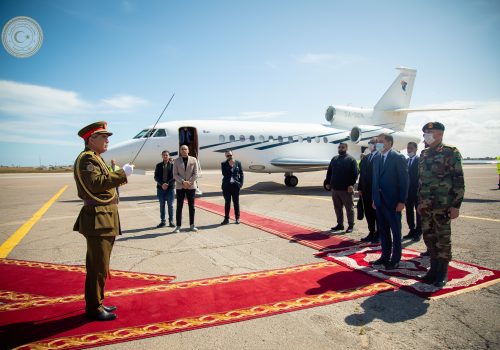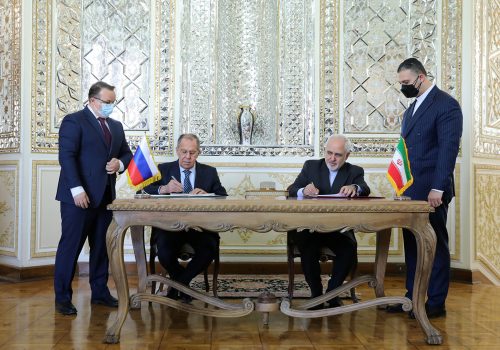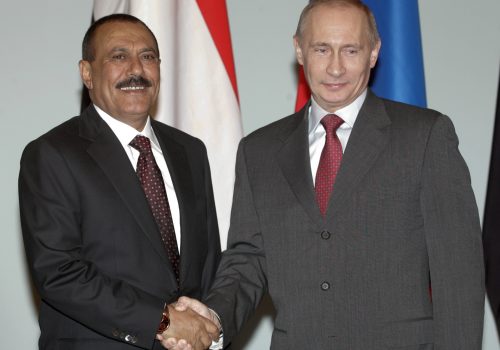Saudi Arabia is trying to make America jealous with its budding Russia ties
Several Western and Arab media sources have reported that the Saudi Deputy Defense Minister Prince Khalid bin Salman signed a “military cooperation agreement” on August 24 with one of his Russian counterparts at the seventh annual International Military-Technical Forum—an arms expo—near the capital Moscow. What exactly has been agreed to, though, is not yet clear.
Prince Khalid made the announcement in a tweet on August 24, stating that the agreement was “aimed at developing joint military cooperation between the two countries.” In another tweet, the Saudi deputy defense minister said that he met with Russian Defense Minister Sergey Shoygu “to explore ways to strengthen the military and defense cooperation” between the two countries and discussed a “common endeavor to preserve stability and security in the region” and “shared challenges.”
The Russian side has not been much more forthcoming, either. The Russian Defense Ministry website noted the meeting between Prince Khalid and Shoygu, but only cited what the prince said about it: “According to the military leader, the cooperation that exists between his country and Russia ‘will contribute to a common response to all modern challenges, which we will carry out together. The challenges that exist,’ he noted, ‘will require even greater cooperation and efforts from us.’”
Radio Free Europe/Radio Liberty quoted Defense Minister Shoygu as making an equally vague statement about the meeting: “We aim for a progressive development of cooperation in military and military-technical fields on the entire spectrum of issues that pose mutual interest.” Shoygu also noted that Russian weapons systems have “proven themselves well in Syria,” reflecting Russian hopes that the Kingdom will buy Russian weaponry.
Despite the vagueness of both Saudi and Russian descriptions, the fact that they have signed a military cooperation agreement at all is significant. Saudi Arabia has traditionally relied on the United States and other Western governments for security assistance. The signing of this Saudi-Russian agreement—whatever it contains—in the wake of the downfall of the US-backed Afghan government and the rise of the Taliban in Afghanistan is a signal that Riyadh does not feel that it can fully rely on Washington and, so, is willing to hedge its bets by turning to Moscow.
In addition, while Saudi Crown Prince Mohammed bin Salman (MBS) had close relations with the Donald Trump administration, the Joe Biden administration has been far more critical of human rights issues as well as Saudi Arabia’s dispute with Qatar and handling of the ongoing war in Yemen. By signing this agreement with Moscow, Riyadh may be signaling that not only is it not going to change its behavior at the behest of the Biden administration, but that there are other countries Saudi Arabia can work with who are not especially concerned with changing Saudi behavior.
Ultimately, the signing of the Saudi-Russian military cooperation agreement may be an effort by Riyadh to change Washington’s behavior. At a time when the Saudis and other Gulf Arabs fear that the US commitment to them may be waning due to what they fear is decreased US interest in the region, they know that Russian-American relations are tense. The Saudis may calculate that being seen to cooperate with America’s rival Russia may induce the US to step up its commitment and reduce its criticism of the Kingdom.
Further, the Saudis must be well aware that Russia is hardly a replacement for America as a security guarantor—something that the recently announced China-Iran-Russia naval exercises in the Gulf can only reinforce. This is just one more example of Russia’s ongoing military cooperation with Iran, which includes Russian-Iranian cooperation in Syria and Russian arms sales to Tehran, that the Saudis and other Gulf Arabs find concerning.
It is possible that if Riyadh’s main aim in signing this security agreement with Moscow is to get more positive attention from Washington, it might work. American arms producers do not want to give up any share of the lucrative Saudi market to Russian competitors. Those in Washington mainly concerned by the Iranian and jihadist threats to the US and its Israeli and Arab Gulf allies also argue that, whatever MBS’ misdeeds, the overall Saudi-American relationship remains cooperative and should stay that way. Still, if the Kingdom goes ahead and purchases Russian S-400 air defense missiles, as has been talked about in the press, the Saudi-American relationship could well deteriorate just like the Turkish-American relationship when Ankara bought Russian S-400s.
For Riyadh, then, the goal may be to make Washington a little bit jealous over its budding ties with Moscow while not upsetting the US too much. Moscow, of course, would be quite pleased if its ties with Riyadh upset Washington just as Russian ties with Ankara have done. Moscow’s ongoing relationship with Tehran—which Russia will not give up for the sake of improved relations with the Kingdom—is likely to induce Riyadh to keep its improving ties with Moscow within bounds.
Mark N. Katz, a professor of government and politics at the George Mason University Schar School of Policy and Government, is a nonresident senior fellow at the Atlantic Council.
Image: AUGUST 24, 2021: The Army 2021 International Military and Technical Forum takes place in Patriot Military Park in the town of Kubinka, 61km west of Moscow. Vladimir Gerdo/TASS.No use Russia.


